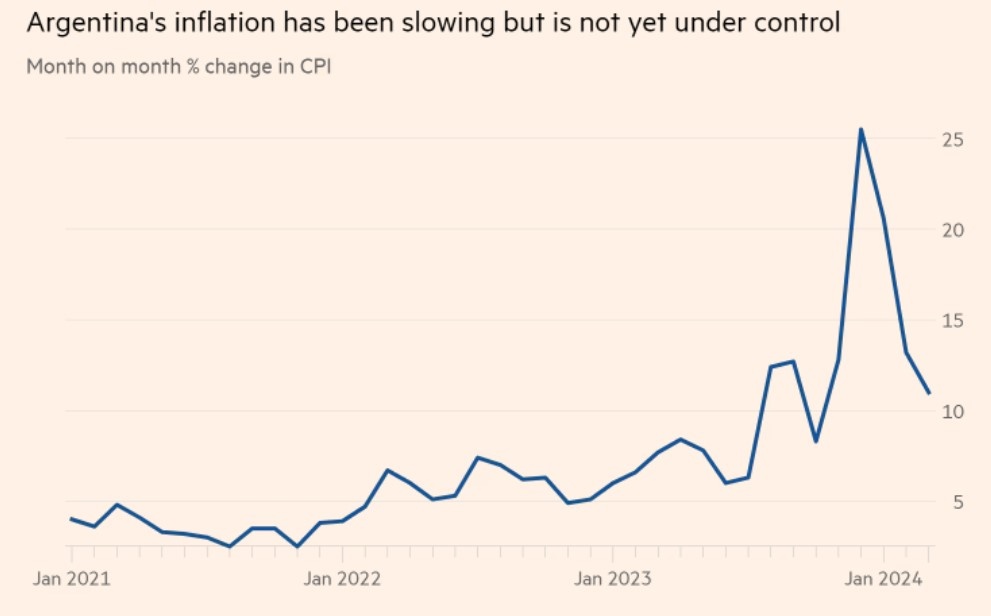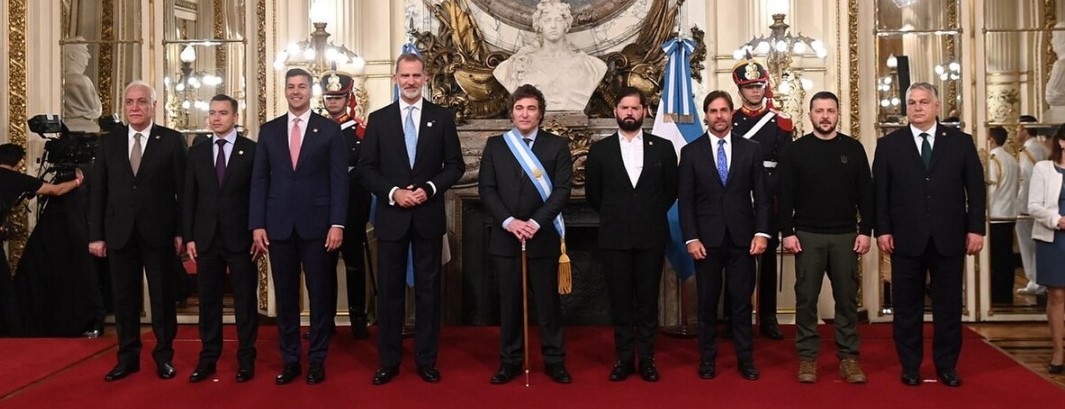By Hilary Barker. This is the second part of a two-part article. The first can be read here.
With the election of Javier Milei last December, the working class of Argentina are facing their greatest challenge for years, in terms of their living standards and basic rights. Workers were already suffering cuts in living standards because of raging inflation and economic collapse and it was the failure of the left to provide a way forward that led to mass disillusionment and the subsequent election of Milei.
Milei won with close to 56% of the vote, and on the day of his inauguration (pictured above), the Argentine economy was suffering 143 percent annual inflation. The currency had plunged against the dollar and four out of 10 Argentines were in poverty.
Milei will not solve the problems of his population, however. His economic ‘solutions’ to the problems of Argentine capitalism are all to be imposed at the expense of workers’ households, that are likely to be even more impoverished.
Milei is a political maverick, a TV and media personality like Trump, and someone who was known for his flamboyant personality and strong media presence. He promised on coming into office to “take a chain saw” to government expenditure – including welfare payments on which the poorest workers depend – and to ‘dollarise’ the economy, although the latter policy has been dropped. At his election rallies, his supporters used to carry chainsaws to symbolise his promise to cut down the size of the state.
Javier Milei nicknamed “El Loco” and for good reason
He is a laissez faire politician and like Trump and Bolsonaro in Brazii, has called climate change a “socialist lie”, a “deception” promoted by neo-Marxists. His policies were described by Nigel Farage as “Thatcherism on steroids”, so it was not surprising that his nickname was “El Loco”.

Milei has wasted no time cutting into state expenditure. One of his first acts as president was to introduce an emergency decree to slash expenditure. It “paved the way for the privatisation of state-owned companies, stripped away workers’ rights including maternity leave, ended limits on exports, and altered housing rental and land ownership laws to allow for foreign investment”. (Guardian December 21). In response to widespread protests that immediately broke out, Milei was unrepentant. “There’s more on its way”, he said, “You’ll find out soon.”
Apart from privatisations and savage spending cuts, Milei’s December decree incuded a major expansion of presidential powers, and slashing of workers’ rights and the right to protest. Nine of eighteen government ministries were closed, including those responsible for education, the environment and women, gender and diversity. Argentina’s currency, the peso, was devalued by more than 50% against the dollar.
Milei closed the ministry of women, gender and diversity
Milei caused particular outrage over his swingeing cuts to women’s rights. “Less than a month after taking power,” a Guardian reported noted, “Milei’s government closed the ministry of women, gender and diversity, seemingly reducing policies against gender violence to mere bureaucratic decoration, and has put at risk the right to legal, safe and free abortion, which was won in 2020”. Milei has a track record of speaking out against women’s rights and is often verbally abusive to women.

The International Trade Union Confederation, in a report, noted that savage budget cuts were threatening the future of schools, universities and public services. Although the International Monetary Fund is delighted at the “impressive” cuts Milei is introducing, it is predicted to lead to a cut in GDP this year.
According to the ITUC, “Milei’s close aides, and the board of the public oil company, have recently received salary increases above the inflation rate. As an example, Senators voted by a show of hands to raise their own salaries by 170%, a decision made while half of their compatriots live in poverty”.
In January, tens of thousands of trade unionists, women and youth took to the streets to protest against his economic and anti-democratic measures. A strike called by the General Confederation of Labour, CGT, was overwhelmingly supported in all large Argentine cities.
While the IMF and the likes of Nigel Farage are happy, it is a different story on the streets. “It’s a very ugly time,” a worker told the Financial Times, as he was trying to sell cleaning produces to restaurants. “My clients have less, so they buy less…Everyone in my neighbourhood is screwed.”
The previous government used subsidies for transport and fuel and there were other welfare payments made in an attempt to maintain living standards, but on the basis of capitalism that inevitably resulted in an acceleration of inflation and political disillusionment. Milei stopped all of the previous government’s palliatives and has devalued the peso by 54 per cent, with the result that annual inflation surged to nearly 300 per cent. It has meant a sudden and dramatic drop in the purchasing power of wages.

Consumer spending plummeted
The austerity and deregulation measures have in very short order driven Argentina’s economy into a deeper pit. The economy shrank 3.6 per cent in the first two months of 2024, compared with the same period a year earlier, and consumer spending has plummeted.
The general strikes in January are an indication of a future of struggles and upheaval that Milei’s policies will produce in the coming months and years. The poorest people in Argentina have always struggled and suffered, but now, with “El Loco” in the presidential palace, things are getting a lot worse.
Postwar governments in Argentina have see-sawed between the far right and Peronists of various hues, but the latter have failed to mobilise for a decisive break with capitalism, a system particularly rotten with corruption and greed in Argentina. The current swing to a far-right government will be met with the rage and opposition of millions of workers, and we can hope that within that opposition there will develop a socialist movement that promises a way out of the vicious cycle of austerity governments. In the meantime, socalists internationally must stand in solidarity with workers in Argentina in their time of need.



